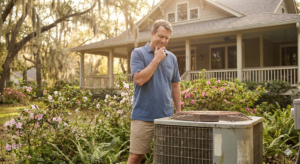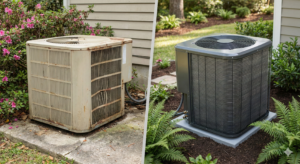Heat pumps are a big part of keeping your home comfortable year-round. They cool your house in the summer and warm it in the winter, all from the same system. When something goes wrong with your heat pump, it throws everything off. Suddenly the house is too hot, too cold, or the airflow feels weak.
If your heat pump stops working, there are a few common problems that could be behind it. Power issues, thermostat problems, blocked units, or clogged filters are all possible reasons. Knowing what to check first can save you time and give you peace of mind before calling for help. Here’s how to handle heat pump issues when they show up in Charleston homes.
Check the Thermostat
Sometimes the problem isn’t with the heat pump itself. The thermostat can cause problems if it’s not working the way it should. If your system isn’t heating or cooling like it used to, the thermostat is the first place to start.
Make sure it’s set to the correct mode—“heat” during the colder months or “cool” during warmer days. It also helps to check that the temperature is set where you want it. If the screen is blank or the numbers look off, the batteries might need to be changed.
Other things to check on your thermostat:
– Confirm it isn’t set to “off” or “fan only”
– Replace batteries if the screen looks dim or doesn’t power on
– Review any scheduled settings on smart thermostats
– Carefully remove dust buildup under the cover
If the thermostat isn’t turning on or still seems off after trying these steps, it could have a deeper electrical problem. For situations like that, it’s time to look at your power source.
Inspect the Power Supply
Once you’ve checked the thermostat, check if your heat pump is actually getting power. Even small power interruptions can cause the system to shut down or act odd. It’s easy to overlook the circuit breaker when dealing with HVAC trouble, but that’s often the fix.
Go to your electrical panel and look carefully at each breaker. If the switch labeled “HVAC” or “heat pump” is out of line with the others, it may have tripped. Try flipping it fully off, then back on again. This resets the power flow and may restart your unit.
Some outdoor units have a separate fuse nearby. If you know where it is and can safely get to it, check for signs of a blown fuse. But if you’re unsure or don’t feel comfortable checking electrical parts, stop there and wait for a technician.
Fall weather in Charleston can shift suddenly. That means heat pumps may kick on and off at unusual times depending on the temperature, which can lead to overload if the system’s already stressed. Make sure your HVAC system doesn’t share a breaker with heavy-use appliances like ovens or dryers, as that could cause tripping too.
Examine the Outdoor Unit
Your heat pump’s outdoor unit is a high-traffic workhorse. It helps keep your home’s temperature balanced, and if it’s blocked or dirty, the whole system can get thrown off. After checking inside the house, step outside and give this component a look.
Start by clearing out any obvious obstructions. This includes built-up leaves, branches, grass clippings, or household items that have been set too close. You want at least two feet of clear space around the entire unit for airflow.
Look more closely for these signs:
– Large amounts of frost or ice on the unit
– Fan not spinning when the system is running
– Odd humming, buzzing, or grinding noises
– Panels or fins that are bent or damaged
– Nesting material or droppings from animals
In Charleston, humidity and coastal storms can cause slow wear and tear on outdoor equipment. Moisture and salt in the air make it even more important to regularly inspect outdoor units. If you’ve cleared space and removed visible debris but the unit still seems off, it might be time to move inside again and double-check airflow from the vents.
Check Air Filters and Vents
A clogged air filter can seem like a small thing, but it can completely stop your heat pump from running correctly. Without clean airflow, your system works harder than it has to and can start to overheat or shut down altogether.
Check your air filter by removing it from its housing. Hold it up to a light—if you can barely see the light through the filter, it’s likely too dirty and should be replaced. If you’re using a washable type, rinse it out thoroughly and make sure it’s dry before putting it back in place.
Once that’s done, walk through your home and look at the air vents. Common culprits include:
– Vents closed or partially shut
– Furniture or rugs blocking airflow
– Dust or debris collecting on or inside vent covers
When airflow is restricted, the heat pump can either run longer than needed or turn off too quickly. Both of these can reduce comfort and increase wear on the system. Be especially watchful in Charleston homes that run their HVAC systems often due to warm temperatures and humidity.
Homes with multiple floors can feel uneven when it comes to temperature balance. If one room feels much hotter or colder than the rest, that can also point to a clogged filter or vent issue.
Know When to Call a Professional
Sometimes troubleshooting can only go so far before a professional needs to step in. There are issues that homeowners just can’t safely identify or fix—especially with deeper electrical problems, internal damage, or refrigerant issues.
You should call for professional help if your heat pump:
– Cycles on and off too quickly
– Runs continuously without making a temperature difference
– Blows air that’s not the right temperature
– Makes new or unusually loud noises
– Shows any clear sign of physical damage
These signs point to parts like capacitors, compressors, or reversing valves needing repairs. In Charleston’s October weather, these problems mean your system might fail when you’re switching between heating and cooling in a single day.
Trained HVAC technicians can safely run full diagnostics on your system. It’s not just turning wrenches—it involves special equipment and tests to read performance levels and spot hidden problems. Taking a heat pump apart without the right training can cause more issues and may affect warranties.
Keeping Heat Pumps Reliable for Charleston Weather
Heat pumps do a lot for homes in Charleston. They’re expected to perform during warm, humid summers and also keep things cozy when the temperatures drop in late fall. Taking care of your system before small problems grow will help it handle all of this.
A few easy reminders can make a difference:
– Check your thermostat often
– Keep air filters clean
– Inspect and clear the outdoor unit regularly
– Avoid crowding vents inside your home
Even if nothing seems wrong, scheduling regular HVAC maintenance can catch issues early. Technicians can test performance, clean coil surfaces, and check electrical parts and refrigerant levels before things break. That way, you avoid downtime and stay comfortable through all the shifts in Charleston’s weather.
Being proactive helps you avoid emergency repairs and keeps every part of the system working like it should. It’s the simplest way to make sure your heat pump is ready for every season.
Keep your heat pump functioning smoothly by addressing issues early and knowing when to bring in support. If problems continue despite your efforts, Coastal Carolina Comfort is here to help with HVAC repair in Charleston. Our team will make sure your system runs efficiently to keep your home comfortable year-round.


